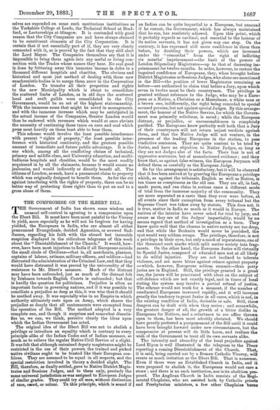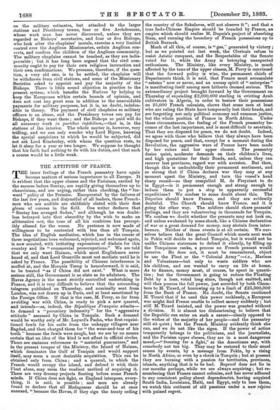THE COMPROMISE ON THE ILBERT BILL.
THE Government of India has shown some wisdom and unusual self-control in agreeing to a compromise upon the Ebert Bill. It must have been most painful to the Viceroy to yield, more especially as he will not be forgiven for having yielded, the Europeans in India, who are almost all either pronounced Evangelicals, decided Agnostics, or avowed Sad- ducees, regarding his faith with the absurd but incurable suspicion displayed in the ridiculous telegrams of this week about the " Disestablishment of the Church." It would, how- ever, have been most injurious to India if all Europeans outside the small circle of Civilians—that is, all merchants, planters, captains of labour, artisans, military officers, and soldiers—had distrusted the administration of the Criminal Law, and that they would have distrusted it was proved by the universality of the
resistance to Mr. Ebert's measure. Much of the distrust may have been unfounded, just as much of the distrust felt by Irishmen towards English Courts is unfounded ; but that is hardly the question for politicians. Prejudice is often an important factor in governing nations, and if it was possible to conciliate a prejudice so deep as this, it was wise that it should be soothed away. It was especially wise in an Empire in which authority ultimately rests upon an Army, which shares the prejudice so deeply that all cantonments were exempted from the operation of the Bill. The method adopted is a very complete one, and though it surprises and somewhat dissatis- fies us, we can, we think, perceive clearly the ideas upon which the Indian Government has acted.
The original idea of the Ebert Bill was not to abolish a privilege or introduce an equality which is contrary to every principle alike of the Indian Codes and of Indian manners, so much as to relieve the regular Native Civil Service of a slight. It was felt that although untrained deputy magistrates might be restricted in the use of their powers, the trained and picked native civilians ought to be trusted like their European con- freres. They are assumed to be equal in all respects, and the special restriction involved in theory a decided slight. The Bill, therefore, as finally settled, gave to Native District Magis- trates and Sessions Judges, and to them only, precisely the same universal jurisdiction as was assigned to European Judges of OMNI. grades. They could try all men, without distinction of race, used, or colour. To this principle, which is sound if an Indian can be quite impartial to a European, but unsound if he cannot, the Government, which has always maintained that he can, has resolutely adhered. Upon this point, which it probably regards as cardinal, and essential to the honour of its native servants, it has not given way one step. On the contrary, it has expressed still more confidence in them than before, by doubling their powers, which are increased under the '° concordat " from the right of inflicting six months' imprisonment—the limit of the powers of London Stipendiary Magistrates—up to that of decreeing im- prisonment for twelve months. In order, however, to restore the impaired confidence of Europeans, they, when brought before District Magistrates or Sessions Judges, who alone are mentioned in the Bill—the position of lower Magistrates remaining as before—are authorised to claim trial before a Jury, upon which seven in twelve must be their countrymen. The privilege is granted without reference to the Judge, who may be a Euro- pean or a Native a Christian or a Mussulman, a white man or a brown one, indifferently, the right being conceded to special accused persons, but not against special Judges. By this arrange- ment, the honour of the Native Service, for which the Govern- ment was primarily solicitous, is saved ; while the European distrust, or prejudice, or unreasonableness is completely pacified. The Europeans know perfectly well both that a Jury of their countrymen will not return unjust verdicts against them, and that the Native Judge will not venture, in the presence of the leading Europeans in the station, to pass vindictive sentences. They are quite content to be tried by Juries, and have no objection to Native Judges, so long as they are not Judges also of the facts. Their fear is not of oppressive sentences, but of manufactured evidence ; and they know that, as against false witness, the European Jurymen will defend them as carefully as the European Judge.
So far the arrangement is satisfactory, but it will be observed that it has been arrived at by granting the Europeans a privilege which, as against the tribunals, English as well as Native, is ten times as conspicuous as the old one. They are all, in fact, made peers, and can claim in serious cases a different mode of trial from the immense majority of the community. They are more separated as a caste than they ever were before, at all events since their exemption from every tribunal but the Supreme Court was taken away by statute. This does not, it is true, matter in India so much as it would in Europe. The natives of the interior have never asked for trial by jury, and aware as they are of the Judges' impartiality, would by no means regard that method of investigation as a boon. They know quite well that the chasms in native society are too deep, and that while the Brahmin would never be punished, the ryot would very seldom escape. The privilege, therefore, is not a privilege in their eyes, but only a mark of separateness, one of the thousand such marks which split native society into frag- ments. On the other hand, the European Juries will virtually be Special Juries, composed of educated men not at all likely to do wilful injustice. They are not inclined to tolerate violence, and are more bitter against crimes against property —which, however, Europeans seldom commit—than petty juries are in England. Still, the privilege granted is a great one, the jurors will be penetrated with ideas on the subject of self-defence which are not exactly legal, and in times of local rioting the system may involve a partial refusal of justice. The scheme would not work for a moment, if the number of uneducated Europeans increased rapidly, and it will increase greatly the tendency to grant Juries in all cases, which is not, in the existing condition of India, desirable or safe. Still, these dangers can be dealt with when they arrive ; and meanwhile, the greatest danger of all, the growth of a bitter dislike in Europeans for Natives, and a reluctance to see office thrown open to them, has been most adroitly obviated. We should have greatly preferred a postponement of the Bill until it could have been brought forward under new circumstances, but the compromise at present will do little harm, and realises the wish of the Government to treat all its own servants alike.
The intensity and absurdity of the local prejudice against Lord Ripon is well illustrated in the telegram to the Times reporting a coming Disestablishment of the Church. That, it is said, being carried out by a Roman Catholic Viceroy, will create as much irritation as the Ilbert Bill. That is nonsense. Even if there were an Established Church in India, and it were proposed to abolish it, the Europeans would not care a straw ; and there is no such institution, nor is its abolition pro- posed. The Anglican Church in India consists of the Regi- mental Chaplains, who are assisted both by Catholic priests and Presbyterian ministers, a few other Chaplains borne on the military estimates, but attached to the larger stations and Presidency towns, four or five Archdeacons, whose work man has never discovered, unless they are regarded as Bishops' secretaries, and four or five Bishops, who look after the chaplains' morals, exercise a very limited control over the Anglican Missionaries, ordain Anglican con- verts, and confirm the children of the Anglican community. The military chaplains cannot be touched, as they are indis- pensable ; but it has long been argued that the civil com- munity ought to pay for their own religious instruction and their own confirmations. We presume, therefore, if the ques- tion, a very old one, is to be settled, the chaplains will be withdrawn from civil stations, and some of the Missionary Societies asked to appoint and pay the majority of the Bishops. There is little sound objection in practice to the present system, which benefits the Natives by helping to keep the Europeans within certain bounds of opinion, and does not cost any great sum in addition to the unavoidable payments for military purposes, but it is, no doubt, indefen- sible in theory. The payment of civil chaplains as military officers is an abuse, and the Presidency towns can pay for Bishops, if they want them ; and the Bishops so paid will do all necessary work in partibus infidelium,—that is, in the stations of the interior. The whole matter is, however, very trifling, and we can only wonder why Lord Ripon, knowing the special suspicions to which he would be subjected, did not ask Lord Kimberley, with whom the question rests, to let it sleep for a year or two longer. We suppose he thought that his faith had nothing to do with his duties, and that such a course would be a little weak.



































 Previous page
Previous page